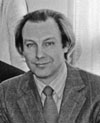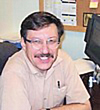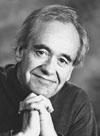In memoriam
In memoriam - Ronald Wareham

Ron Wareham came to the English Department of Loyola College in 1959 and taught his last class at Concordia University in the spring of 1997. Over that nearly 40-year career here (before that he had taught at the University of Michigan and Cal State), he inspired numerous students to enjoy words and ideas and all the pleasures of the text.
He was a wonderfully learned, helpful, engaged and engaging colleague and friend, sometimes enigmatic, sometimes impish, always a humane and thoughtful presence in our deliberations and activities. Ron died in Montreal on May 19.
At the funeral service, the priest remarked that Ron no doubt had a special place reserved for him in the afterlife where he would still be surrounded by his books.
And surrounded he was in his Loyola office. They were on shelves, chairs, the desk, the floor, every available inch of space (and what space was left was filled with papers and folders of more papers).
What he loved most to do was seek out links and connections, to demonstrate how ideas, figures, words form and re-form. His courses were all about making these connections.
In one, he examined the interaction of philosophy and imaginative literature. In another, Nature and Art in Renaissance Literature, he looked for ways to answer the question “Should the poet strive to transform nature through the exercise of the imagination or to represent it?”
In what I think was his favorite course, Myth and Ideas in Literature, he ranged through topics as diverse as wisdom, justice, courtly love, madness, revolution, temperance, courage, and the last two on the list: nothing and the masks of God.
He loved to explore the past and to recreate it. He took his classes to Stratford and he also brought them and interested colleagues to Lacolle (a property that for some years belonged to the university) for weekends of Renaissance reading and feasting; I particularly remember a wonderful weekend read-through of Paradise Lost.
Indeed, Spenser and Milton were the authors he always returned to and we bonded over Milton, comparing our rather different approaches but always coming back to those words we loved to speak aloud.
Even before his retirement, Ron had started going to China to teach and to learn.
He found the students there a pleasure to teach and he returned year after year. Indeed it was only about a year ago that he realized that he had to come back to Canada for medical reasons, but he still hoped to be able to return, for teaching really was his life work.
Judith Herz, English Department
In memoriam - Victor Rossokhaty

The university mourns the loss of Victor Rossokhaty, professor of Electrical and Computer Engineering, who died accidentally in an electrical storm while camping near Sudbury, Ont., on Aug. 9.
Dr. Rossokhaty obtained his PhD in 1989 in physics and mathematics from the Kiev National University in Ukraine. His research was devoted to transport and optical effects in the III-V graded semiconductor devices.
In 1980, he received his master’s degree in semiconductor physics and microelectronics from the Moscow Institute of Physics and Technology for research and development of non-volatile memory.
In Russia, Dr. Rossokhaty worked for the Kiev Radioelec-tronic Company and at Kiev National University. He also worked as a visiting scientist in research laboratories in France and Germany. In 1990, he was recognized by the National Academy of Science of Ukraine for his research in graded semiconductors.
His recent scientific interests were in the research and development of semiconductor devices and systems, computer modelling, sensor electronics, and organic semiconductors.
He came to Concordia in 2002. The Toronto Star, reporting on his death on Aug. 11, quoted Dean Nabil Esmail describing him as “a big strong man” who loved his new life in Canada and was “extremely excited” about joining the Faculty of Engineering and Computer.
Our deepest sympathies are with the Rossokhaty family for this sudden and tragic loss.
In memoriam - Harry Hill

Professor Harry Hill died in Montreal on Aug. 18, 2005. Harry Joseph Charles Hill, known to students and colleagues alike as “Harry”, taught English, first at Loyola College, and then at Concordia, from 1970 until his retirement in 1999. During that time, he established a reputation as an inspiring teacher, a generous mentor of students, and a champion of high standards in writing, reading, and living.
Born in Aberdeen, Scotland, and educated there and at the University of Alberta, he taught at the University of Victoria and Winona State in Minnesota before coming to Montreal. Everywhere he lived, he was active as a teacher and an actor, performing in university productions of Façade, Sleuth, Krapp’s Last Tape, The Christian Brother, and The Dresser, and several memorable roles at the Centaur. Although he preferred live theatre, he took great satisfaction in performing television roles written for him by former students.
To see his theatrical and academic careers as distinct is to misunderstand Harry: he was equally accomplished as actor and teacher, and he saw the two arts as inseparable. In all he did, he was committed to the cultured life (he was also a gifted musician), and the vitality of the arts in the lives of all with whom he came in contact. Travel, museums, concerts, live theatre (though he joked that he was usually too restless to stay for the second act of any performance, unless he was on stage), excellent food and wine, and above all, literature, were integral to the imagination richly lived. His textbook, A Voice for the Theatre, draws on his convictions in integrating the theatre and the academy: it is both a guide for actors and for students of literature in combining literary insight with the voicing of the text.
His contributions to Concordia are substantial and lasting. Beyond his dynamic teaching of courses in poetry, drama, critical reading and Shakespeare, he pioneered the credit theatre program at Loyola, mentored numerous student productions and satirical revues, and he served for many years as coordinator of the English Composition program. He won Concordia’s Guinea Pig Award for establishing what was probably his least popular achievement, the University Writing Test, though he never failed to point out that it responded to a student initiative.
A vivid figure of passion, intelligence, laughter, and devotion to the arts, he occupied a niche in our lives which is likely to remain empty.
A memorial service will be held in the Loyola Chapel on what would have been his 65th birthday, Oct. 17, at 2 p.m.
He is survived by family in Scotland and many friends in Canada.
John Miller, English Department